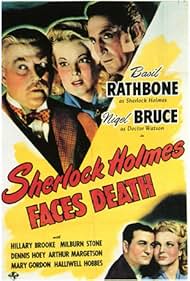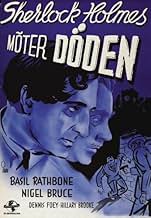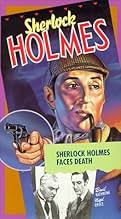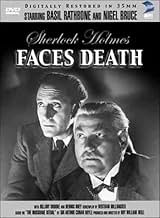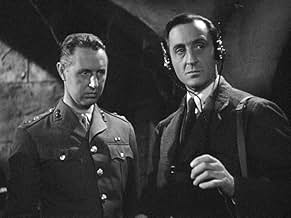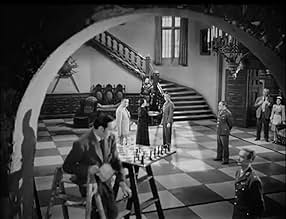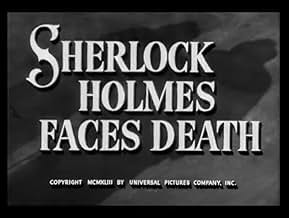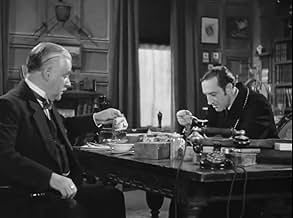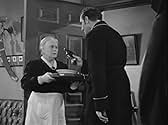During WWII, several murders occur at a convalescent home where Dr. Watson has volunteered his services. He summons Holmes for help and the master detective proceeds to solve the crime from ... Read allDuring WWII, several murders occur at a convalescent home where Dr. Watson has volunteered his services. He summons Holmes for help and the master detective proceeds to solve the crime from a long list of suspects including the owners of the home, the staff, and the patients reco... Read allDuring WWII, several murders occur at a convalescent home where Dr. Watson has volunteered his services. He summons Holmes for help and the master detective proceeds to solve the crime from a long list of suspects including the owners of the home, the staff, and the patients recovering there.
- Director
- Writers
- Stars
- Geoffrey Musgrave
- (as Frederic Worlock)
- Slinking Figure
- (uncredited)
- Nora - Maid
- (uncredited)
- Constable
- (uncredited)
- Pub Proprietor
- (uncredited)
- Mrs. Hudson
- (uncredited)
- Director
- Writers
- All cast & crew
- Production, box office & more at IMDbPro
Featured reviews
The setting has Watson staying in the Musgrave house, which is being used as a convalescent home for army officers, when a series of violent crimes breaks out. The mystery that arises combines suspense with an interesting puzzle that must be solved. The villain in many of the movies in the Universal series is known from the beginning, but this is one of the exceptions, allowing the viewer to try to deduce what is happening from the same clues that Holmes has available.
Rathbone and Bruce always work well together, and Dennis Hoey always adds some good moments whenever he appears as Inspectator Lestrade. Some of the secondary characters, especially some of the recovering officers, are also interesting. Although this, like the rest of the Universal Holmes features, is set in the (then) present, the setting in the old mansion gives it an atmosphere more like the earlier era of the Doyle originals. Anyone who enjoys the other features in the series should not be disappointed by this one.
Here, the allusions to WWII are vague, at best. Gone are the overt references to the Nazis and the intrusive patriotic speeches...which merely impeded upon the proceedings in the previous films. Holmes is in his element here, solving a dense mystery by using deductive reasoning. The film is still modern, making use of such devices as automobiles, telephones, and electric lights. But this is all incidental. If we overlook the updating of the surface elements, the story itself is rather timeless. Telephones and automobiles were present in Conan Doyle's later Holmes stories, anyway...and the Gothic tone of this film (and several of those which followed) gives it an almost Victorian or Edwardian feel, despite being obviously set in the mid-20th Century. And most importantly, Holmes is back to the business he should never have abandoned.
Loosely based on The Musgrave Ritual, the film is entertaining and certainly of higher technical quality than its predecessors, despite the fact that the series was forever doomed to the ranks of the low budget B-picture. The camera work is evocative, with fluid motions and intriguing angles...which would become a staple of the Holmes series...and the direction is excellent, with Roy William Neill (who also began his role as Associate Producer with this film) really coming into his own as the driving force behind the franchise. Rathbone's Holmes (whose hair has, thankfully, undergone quite a transformation) is in better form here than in previous entries...detached and focused, he relies on reasoning, rather than chance, in order to solve the mystery that's presented to him. Nigel Bruce, as Watson, turns in his usual bumbling-yet-lovable performance. Dennis Hoey once again manages to out-bumble Watson as Inspector Lestrade of Scotland Yard...a canonical character who made his first Universal appearance in Sherlock Holmes and the Secret Weapon, and would go on to appear in a total of six of the twelve films.
Overall, not the best film in the series, but a step in the right direction. Once the filmmakers got their proper footing, in regard to the series' new and improved direction, they produced much better work...peaking, many (myself included) would attest, in 1944 with The Scarlet Claw. Other subsequent Holmes titles, such as The Spider Woman and Terror By Night, also outshine, in my estimation, this fourth Universal venture. But this film marked the great change that heralded all the treasures to come...and as such, has amassed much favor among fans and critics alike. And rightly so.
'Sherlock Holmes Faces Death (1943)' was adapted, rather loosely, from Arthur Conan Doyle's short story, "The Adventure of the Musgrave Ritual," which was first serialised in "The Strand Magazine" in 1893. Still in the midst of the Second World War, Dr. Watson (Nigel Bruce) has volunteered his services at Musgrave Hall, now a convalescent home, in Northumberland. Detective Sherlock Holmes (Basil Rathbone) is first summoned to the old house after Watson's assistant (Arthur Margetson) is unexpectedly attacked by an unknown assailant. By the time the detective arrives, however, the head of the house has been murdered and covered with autumn leaves. The fiancé of the murdered man's innocent sister (Hillary Brooke) is immediately suspected, and a cocky Insp. Lestrade (Dennis Hoey) wastes no time in placing him under arrest, after formulating an unashamedly inadequate solution. Holmes, meanwhile, begins to deduce that this mystery goes back considerably further than anticipated, perhaps stretching back to a centuries-old family ritual, whose meaning has been lost for generations. Can he solve the mystery before it claims its next victim?
Not surprisingly, Rathbone and Bruce are excellent in their signature roles, successfully avoiding the "going through the motions" performances that usually accompany such familiarity with a character. The supporting players are adequate, if not notable, though Dennis Hoey is very enjoyable as the smug and incompetent police detective Lestrade. The story has a few indirect references to combat, but Holmes' talents don't contribute anything to the war-effort; he's much more at home when he's tackling smaller and more cunning foes than the Nazis. Above all else, Van Enger's cinematography is the picture's major star, and, considering that the filmmakers must surely have been working with a restricted budget, the crisp black-and-white photography brilliantly evokes the mood of a considerably more expensive film. Director Roy William Neill delights in subtle storytelling tools that increase the film's creepiness, including the mansion's blustery, leaf-strewn entrance, a uncannily-clever black raven, a clock-tower that occasionally strikes thirteen at midnight, and a supposed dead body that reaches out a clammy hand to ensnare the cold-blooded murderer.
Storyline
Did you know
- TriviaReferences Sir Arthur Conan Doyle's original Sherlock Holmes story, "The Adventure of the Musgrave Ritual".
- GoofsThe land grant / crown grant that was given to the Musgraves by a King Henry, lists King Henry as being King of "Great Britain, France Scotland and Ireland." This is in error, since there have been only "8" King Henry's in England's history, the last being "Henry VIII" in the 16th century. England didn't become part of "Great Britain" until 1707, with the "Act of Union" passed under Queen Anne. This occurred 160 years after Henry VIII's death. There is also some doubt regarding the use of "France", since France oftentimes either wasn't a united country or existed side-by-side with England, thus making for confusion. The English king in question, would likely have referred not to "France" as part of his kingdom, but to which territories (such as Normandy) he controlled.
- Quotes
[last lines]
Sherlock Holmes: There's a new spirit abroad in the land. The old days of grab and greed are on their way out. We're beginning to think of what we *owe* the other fellow, not just what we're compelled to give him. The time is coming, Watson, when we shant't be able to fill our bellies in comfort while other folk go hungry, or sleep in warm beds while others shiver in the cold. And we shan't be able to kneel and thank God for blessing us before our shining altars while men anywhere are kneeling in either physical or spiritual subjection.
Dr. John H. Watson: You may be right, Holmes... I hope you are.
Sherlock Holmes: And, God willing, we'll live to see that day, Watson.
- ConnectionsEdited into Who Dunit Theater: Sherlock Homes Faces Death (2021)
Details
- Runtime1 hour 8 minutes
- Color
- Aspect ratio
- 1.37 : 1
Contribute to this page

